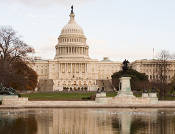
Agricultural News
Federal Spending Bill Includes Important Provisions for Producers
Tue, 15 Jul 2014 16:16:35 CDT

The House Interior appropriations bill passed through committee today 29 to 19. The Public Lands Council and the National Cattlemen's Beef Association strongly support the bill, which allocates how federal dollars are spent for the Department of Interior, Environmental Protection Agency, and related agencies during fiscal year 2015. The bill included language that would help provide relief from the regulatory burdens that continue to hamper the productivity and profitability of farmers and ranchers across the country.
From language that blocks the listing of the Sage Grouse, to requiring alternative allotments where ranchers are impacted by drought or wildfire without the need to complete extensive environmental analyses and many others, Dustin Van Liew, PLC and NCBA federal lands executive director, said the provisions are important to keeping livestock producers in business.
Included in the bill is a permanent extension of grazing rider, which will allow livestock grazing to continue while the renewal process is held up through the National Environmental Policy Act analysis backlog. Often requiring multiple environmental analyses and time for public comments to be submitted when no changes are being made on the ground, the NEPA process can disrupt ranching operations indefinitely with little, if any, environmental benefit. The bill also includes a provision to extend grazing permit terms to 20 years, as opposed to the current 10-year term.
"These two provisions are vital to the agencies, allowing them the flexibility they need to continue managing the resource and processing permits," Van Liew said. "Additionally, extending grazing permits from 10 to 20 years adds significantly to the certainty ranchers need to run successful businesses. We applaud the appropriations committee for supporting the primary language from the Grazing Improvement Act and urge the full House and Senate to pass this bill without delay."
Van Liew added that due to a closed-door settlement between United States Fish and Wildlife Service and radical environmental groups, arbitrary deadlines have been set for making hundreds of decisions on species in all fifty states to be listed under the Endangered Species Act.
"Rather than embracing the research-backed benefits of grazing and giving time for state Sage Grouse management plans to take effect, the FWS has begun to make arbitrary decisions to cut and reduce livestock grazing on public lands," said Van Liew. "One of those species is the Sage Grouse, whose habitat covers 11 western states, an area where ranchers are currently providing open space and improving the bird's habitat and reducing the number-one threat to the bird wildfire."
Ashley McDonald, NCBA environmental counsel, commended lawmakers for including language that would help reign in the EPA's attempt to control even more land and water on private property.
"Cattle producers have grave concerns over EPA and Corps of Engineers' proposed expansion of the Clean Water Act," said McDonald. "We applaud the members of the committee for sending the Interior appropriations bill forward with language that would prevent the agencies from finalizing this regulation, which we see as the largest federal land grab in history."
Additionally, she said, the bill will prevent the EPA from requiring livestock operations to report their greenhouse gas emissions, and also prevent the agency from requiring livestock operations to get GHG permits. Furthermore, it prevents the EPA from disclosing the private and confidential information of livestock producers to the public.
"This bill provides needed safeguards for the privacy and property rights of America's cattle producers that the federal agencies refuse to recognize and respect," McDonald summarized.
WebReadyTM Powered by WireReady® NSI
Top Agricultural News
More Headlines...



















